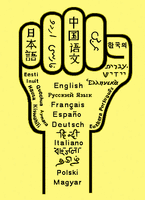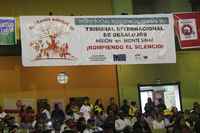International Call for Cases of Evictions due to the Tourism
Do Not Keep Silent: Communicate Your Case of Eviction! The Deadline is July 15th 2017!
International Tribunal on Evictions
Session on Tourism (Venice, 28-30 September 2017)
» International Call for Cases of Evictions due to the TourismThis September in Venice! Global capital of resistance to tourism evictions
It’s time to speak up: people around the world denounce your tourism-related eviction! This call for solidarity was announced at the press conference to launch the sixth Session of the International Tribunal on Evictions (ITE), which will take place in Venice at the opening of the World Zero Evictions Days in the framework of the International Year of Tourism.
» This September in Venice! Global capital of resistance to tourism evictionsWhat is the International Tribunal of Evictions?
The International Tribunal on Evictions (ITE) is a peoples’ and opinion tribunal established in 2011 by the International Alliance of Inhabitants and civil society organisations for the World Zero Evictions Days to practically and interactively put forced evictions from around the world in the dock. The Tribunal relies on the expertise of an international Jury of well-respected and competent individuals, as well as on the International Covenant on Economic, Social and Cultural Rights (ICESCR) and other instruments of international law, in order to pass judgement on real cases of forced evictions that constitute human rights violations.
» What is the International Tribunal of Evictions?International Call for Cases of Evictions due to the Tourism
Do Not Keep Silent: Communicate Your Case of Eviction! The Deadline is July 15th 2017!
International Tribunal on Evictions
Session on Tourism (Venice, 28-30 September 2017)
» International Call for Cases of Evictions due to the TourismWhy the ITE Session on Tourism? Growing human rights violations caused by over-tourism
Despite the problems caused by the global crisis, wars and terrorism, tourism has risen to 1,235 billion people in 20162, increasing its pressure on communities, notably in South America, Africa and Asia, without diminishing its hold in Europe and North America. However the tourism industry, in its many forms, is a growing cause of forced evictions because, under the pretext of popularizing exchanges and enjoyment of the world, tourism is turning cities and territories into goods and their inhabitants into extras.
» Why the ITE Session on Tourism? Growing human rights violations caused by over-tourismTwo good reasons for choosing Venice
There are at least two good reasons for choosing Venice as the site of ITE Session on tourism.
First. Venice is one of the saddest examples of the pressure caused by tourism: this unique city, subjected to policies prioritising the tourism industry, has experienced massive dislocations - effectively evictions through economic methods - that has seen its population reduced to less than 54,000 in 2017 compared to 175,000 in 1953. Meanwhile, Venice is undergoing growing tourism pressure with 9 million overnight tourists and 24 million commuter visitors in 2016.
» Two good reasons for choosing VeniceSign the the Berlin Declaration for "Transforming Tourism"!
Transforming our world is not possible without transforming tourism. We want not only to encourage further reflection and debate, but demand concrete activities. So far, over 200 individuals and more than 35 organisations have endorsed the Declaration. Join them and endorse it: as an individual, please click here , as an organisation, please write an email to tourism-watch@brot-fuer-die-welt.de .
For more information please visit www.transforming-tourism.org
» Sign the the Berlin Declaration for "Transforming Tourism"!The International Alliance of Inhabitants is a global network of associations and social movements of inhabitants, cooperatives, communities, tenants, house owners, homeless, slum dwellers, indigenous populations and people from working class neighbourhoods. The objective is the construction of another possible world starting from the achievement of the housing and city rights.










